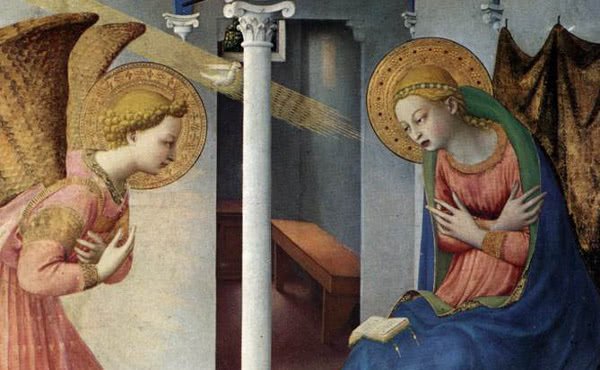The most important conversation in history took place in a small house in Nazareth. It was a conversation between God himself, through the ministry of an Archangel, and a Virgin named Mary, from the house of David, espoused to a craftsman named Joseph.
Most likely, Mary was recollected in prayer, perhaps meditating on a passage of Sacred Scripture referring to the Lord's promise of salvation. That is how Christian art has depicted the scene, in some of its most beautiful representations of our Lady.

Or perhaps she was busy at her household tasks, in which case she would also have been praying. For everything in Mary's life was an occasion and a motive to carry on a constant dialogue with God.
—Hail, full of grace, the Lord is with you! (Lk 1:28).
On hearing those words, Mary was greatly troubled at the saying, and considered in her mind what sort of greeting this might be (Lk 1:29). Not only the angel's sudden appearance, but also what he says causes her to be perplexed. Alarmed, she asks what the reason could be for such praise. In her humility, she sees herself as of little significance. Knowing the Scriptures well, she realizes immediately that this heavenly messenger is transmitting to her an unheard of message. Who is she to deserve such praise? What has she done in her brief life? Certainly, she wants to serve God with all her heart and soul. But she considers her life to be very far from the heroic deeds that won praise for Deborah or Judith or Esther, women so renowned in the Bible. Still, she realizes that this divine announcement is meant for her: Hail, full of grace!
"In her reply there is not the least shadow of doubt or disbelief. Since her earliest childhood, her only concern has been to fulfill the divine will."
St. Luke, in recounting the title given to Mary by Gabriel, full of grace, uses a Greek word that signifies that our Lady has been completely transformed and sanctified by God's grace. As the Church would later clarify, this had already occurred in the first moment of her conception, in consideration of the mission she was to carry out: to be the Mother of God in his human nature, while remaining always a Virgin.
The Archangel, aware of Mary's unease, seeks to calm her by explaining—now using her proper name—the reason for so exceptional a greeting:
Do not be afraid, Mary, for you have found favor with God. And behold, you will conceive in your womb and bear a son, and you shall call his name Jesus. He will be great, and will be called the Son the of Most High; and the Lord God will give to him the throne of his father David, and he will reign over the house of Jacob for ever, and of his kingdom there will be no end (Lk 1:30-33).
"She doesn't limit herself to simply giving permission; she pronounces a yes—fiat!—in which she commits her entire soul and heart, in full accord with God's will."
Well aware of the messianic prophecies, on which she has often meditated, Mary understands that she is to be the Mother of the Messiah. In her reply there is not the least shadow of doubt or disbelief. Since her earliest childhood, her only concern has been to fulfill the divine will. But she wants to know how such a marvelous event will come about, since inspired by the Holy Spirit she has resolved to give herself to God with a virginal body and heart.
St. Gabriel then informs her of the divine way in which motherhood and virginity will unite in her womb: The Holy Spirit will come upon you, and the power of the Most High will overshadow you; therefore the child to be born will be called holy, the Son of God. And behold, your kinswoman Elizabeth in her old age has also conceived a son; and this is the sixth month with her who was called barren. For with God nothing will be impossible (Lk 1:35-37).
Mary doesn't hesitate: With all the strength of her will she responds to the invitation from heaven. She doesn't limit herself to simply giving permission; she pronounces a yes—fiat!—in which she commits her entire soul and heart, in full accord with God's will: Behold the handmaid of the Lord; be it done unto me according to your word (Lk 1:38).
And the Word was made flesh, and dwelt amongst us (Jn 1:14). As we contemplate once again this mystery of God's humility and the humility of his creature, we break forth in an exclamation of gratitude that can never end: “Oh, Mother, Mother! With that word of yours—fiat, 'be it done'—you have made us brothers of God and heirs to his glory. Blessed art thou!" (The Way , 512).
J.A. Loarte
